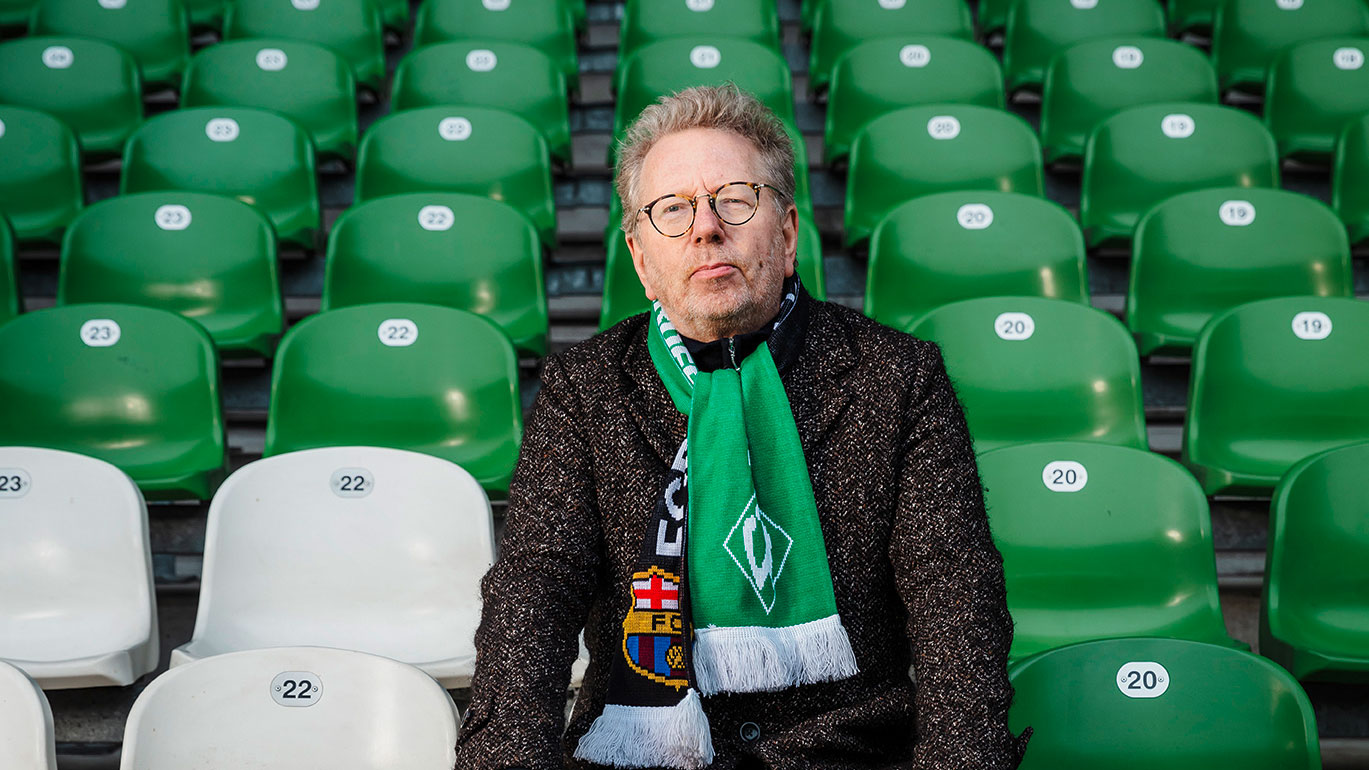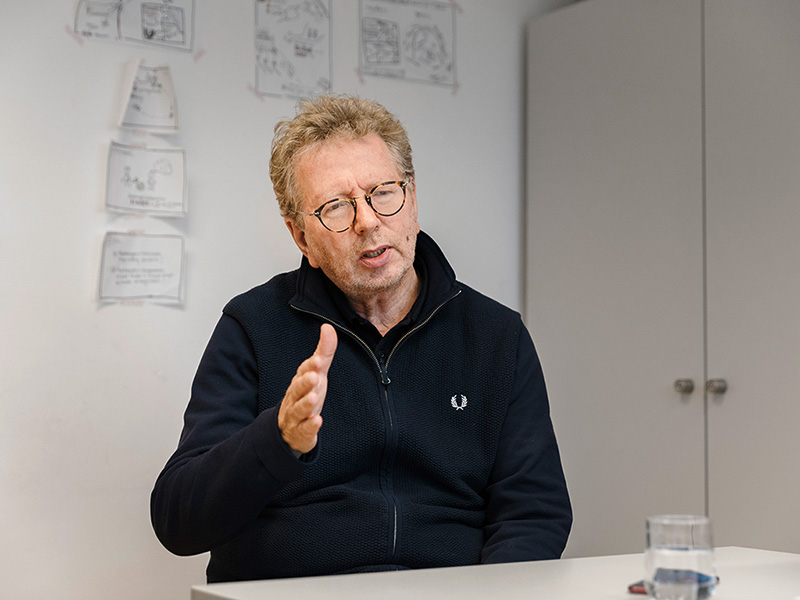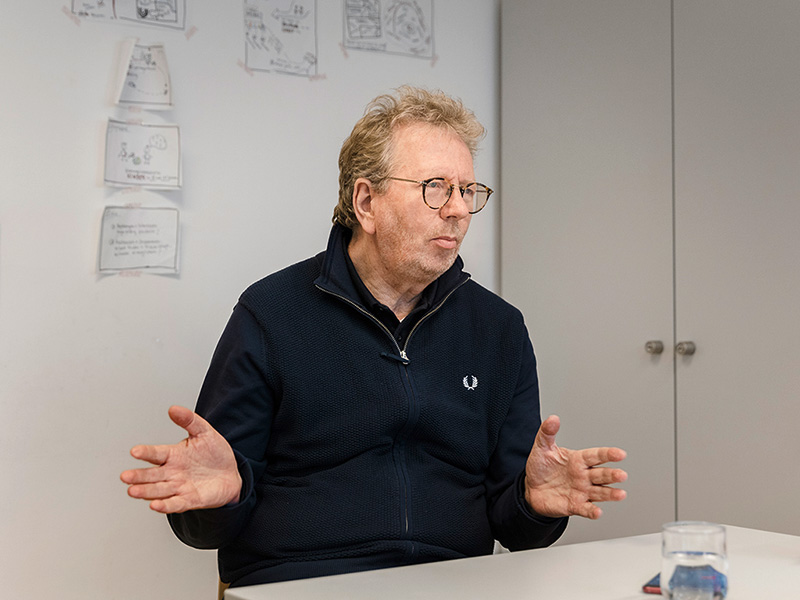
©GfG/Universität Bremen
And then? I started to do more than just write articles
Your degree is over, bring on your first job – or not? In the new Yearbook of the University of Bremen, graduates tell us about their lives after graduation.
The journalist Cordt Schnibben was born in Bremen and studied economics at the University of Bremen from 1972 to 1979. He was part of the second year of first-semester students who went to the university that was founded in 1971. Later in life, he was an editor for “Zeit“ and amongst other things, was head of the society department at the “Der Spiegel” news magazine from 2001 to 2013. Today, Schnibben is active in promoting digital media competence in society.
Mr. Schnibben, what is the first thing that comes to mind when you think back to your time at the University of Bremen?
I have actually thought a great deal about my degree recently. It is regularly the case that I wake with a start in the night and think, “Damn, I still need to get a statistics course certificate!” It is strange because I must admit that I did not only study during several of my 14 semesters. I was a dedicated communist back then. For example, I organized strikes and demonstrations against the occupational ban and was active within the German Communist Party. I only really made an effort in the last semesters and during my diploma thesis. Based on the historic development of the steel industry, my fellow student Paul Schröder and I proved that the opinion, which was prevalent back then, that the profit of today is the investment of tomorrow and the jobs of the day after tomorrow did not in fact apply to the steel industry. The profits rather led to the reduction of jobs. I was captivated by the topic.

©GfG/Universität Bremen
What led you to being so politically active at such a young age?
My mother died when I was 13 years old. My father was a Nazi and remained one until he died. That is what I was processing. At that time, a strong school pupil movement started in Bremen. It was encouraged by the protests of 1968 and parents who were in the underground movement during the Nazi period or had survived the Holocaust. They gave courses on Marxism for young people in villas in the Schwachhausen district. I then moved from the Gymnasium am Barkhof high school to the Reformschule Huckelriede high school, where pupils had more freedom of choice in terms of the lessons and where the so-called Socialist School Pupil Association had more to say. That is why it was clear to me after my high school qualifications that I would go to East Berlin for one year and study Marxism at the external branch of the Karl Marx University – that was a code name for the German Communist Party boarding school.
You returned to Bremen after that year – why?
I had a nice time in East Berlin. Us Germans from the West were an attraction on the East Berlin pub scene. I always called it the “Ché factor”: Revolutionaries with cool, British clothes, who were able to shop at Intershop. However, it was very clear that I wished to return to Bremen. I saw myself as a pro- fessional revolutionary back then and it was my job to shake up the West Germans. I also went back to Bremen because of the University of Bremen. There was such a promising atmosphere of change there. Nearly all of the students and professors were left-wing. Apart from the professor, by the way, who is appar- ently still giving me nightmares about the sta- tistics certificate. That was the only conservative and he was actually quite a nice guy. We nearly felt sorry for him at times.

©GfG/Universität Bremen
If you were not just studying for the majority of the time, what were you actu- ally doing whilst you were enrolled at the university?
For example, I distributed the German Communist Party’s “Bramme” newspaper in front of the Klöckner company or campaigned in the Lila Eule and at the Mensa cafeteria parties. Did you know that they showed Swedish pornographic films in a side room at the Mensa cafeterias parties? Pornography was seen as being revolutionary in terms of sexual liberation.
How did the communist revolutionary turn into a “Spiegel” department head?
I fell into a rather black hole after my degree. My grade average was 1.0134 and I did not have a clue what I should do with my quali- fication. Then I saw an advertisement somewhere: “Do you want to be a journalist?” it asked. The advertisement came from the journalism school, which is now called the Henri Nannen School. And I thought: You are quite good at writing flyers. A journalist – that would be quite something. I initially applied for a trainee year at the Nordwest-Zeitung newspaper. They did not, however, take a liking to my left-wing background. The Henri Nannen School also then rejected my application. As advertising copywriters were desperately needed at the time, I did that and then went on to create advertisements and TV commercials for companies such as Club Mediterrane and Lufthansa. I was, after all, trained in propaganda.
“ Those who want to be responsibly informed must be their own chief editors in order to decide which sources are trustworthy.“
From a communist to an advertisement copywriter: That sound like quite a bio- graphical change. Did it feel like an immense change?
The price I paid for my job as a copywriter was actually losing all of my friends. But that was also quite healing. I was finally able to view political developments with a little more distance, from the outside, and was able to break free from the ideological labyrinth in which I found myself. My second application to the Henri Nannen School was, by the way, successful. However, I do not think it had anything to do with my talent. It was more a case of that they were impressed that I was willing to swap my 7000 German Mark copywriting salary for the 1000 German Mark salary of a journalism student.
You have celebrated great success as a journalist. Amongst other things, you have received the Adolf Grimme Prize twice. Instead of resting on your laurels, you are active in the areas of journalism develop-ment in times of media change and also the promotion of media competence in society, especially in schools. What drives you?
We live in times in which social media such as Facebook, Instagram, and YouTube is avail- able alongside classic channels of media: newspapers, magazines, radio, and television. Those who want to be responsibly informed must be their own chief editors in order to decide which sources are trustworthy. Due to the internet and social media, everyone can theoretically publish work to a large audience. This means there are great emancipatory chances but also big risks. Fake news are spread, many people publish without being aware of how one must protect the rights of others, the rights to one’s own image, and other things that must be adhered to by every journalist. Using our “Reporterfabrik” online learning platform and the “Reporter4You” school project, we want to strengthen the public’s media competence. We go into schools, amongst other places, and are currently trying to initiate advanced training for teachers. These efforts are connected to my time at the University of Bremen. During my degree, the social responsibility that one has as a univer- sity graduate was emphasized and I always stood for this to an extreme extent as a journalist.
After studying social sciences at an external branch of Leipzig’s Karl Marx University in East Berlin, Cordt Schnibben graduated in economics at the University of Bremen in 1979.